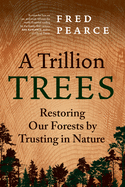
The idea of planting one trillion trees to turn back the press of climate change and humans' planetary destruction has been kicked around for a few decades now. But what does that really mean? And how could it be done effectively so that the impact is real and lasting, not just large gestures that can cause greater harm than good? In A Trillion Trees: Restoring Our Forests by Trusting Nature, environmental journalist Fred Pearce asks these important questions. He finds practical, if potentially uncomfortable, answers by exploring forest ecosystems ranging from the Amazon rainforest to the hills of Nepal--and everywhere in between.
Pearce (Fallout) clearly outlines how forests and international waterways are deeply intertwined and interdependent. He also deftly points out the hypocrisies and failures of the so-called green initiatives of rich nations, asserting that a "global restoration of the world's forests will require rich nations to take responsibility for the impact of their consumption, to both protect existing forests and make room for more."
The author combines knowledge from environmental science, meteorology and the perspectives of Indigenous communities around the world to provide evidentiary support for the practices of stewardship as Indigenous tribes engage in it, community forests and agroforestry. Above all, Pearce demonstrates that nature knows best. Reforestation is successful when done in the right places with an emphasis on biodiversity, usually by just letting the forests recover without human interference. Readers will leave this comprehensive piece of nonfiction with a sense of hope and direction for the future (and homework, thanks to an extensive further reading list). --Michelle Anya Anjirbag, freelance reviewer

